REN produces
Time and Space for the Harmony of People through Japanese Traditional Culture
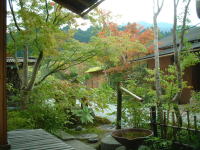
Mushin-an, Ohara Kyoto
What does Japanese Traditional Culture mean to you?
REN provides various opportunities to enjoy and to learn from the wisdom of it.
If you are a Japanese, what do you think of calling our inherent Japan or Japanese back to ourselves with the main theme of "tradition" in mind as we live in an era we tend to lose our own sense of identity of being Japanese?
REN offers the time and space for you.
REN's intended activities are:
- Planning and executing various events, workshops, educational visits, etc. related to Japanese traditional culture
- Planning and executing exchange with foreign cultures for the mutual understanding and the development of each other's
- Researching contributions of Japanese traditional culture to the regional community
- Organizing classes for children to learn Japanese traditional culture
- Organizing classes for people to learn food culture of Japanese tradition
- Publishing to familiarize people with Japanese traditional culture
- Hosting ochakai (tea party) to enjoy chanoyu (tea ceremony) - We will organize and host your ochakai. See the following.
Tea Party (Ochakai) hosted by REN
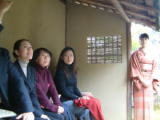
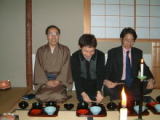
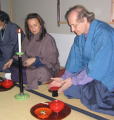
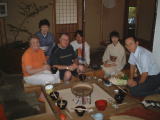
History of "salon" is the history of culture and creation of the country of Japan. Tea has been playing an irreplaceable role for harmonizing people. The form of chanoyu, established in the sixteenth century under the influence of Zen Buddhism, has been providing the ultimate time and space to savor tea and, thereby, to purify the mind of people. Actually, however, chanoyu has been difficult for the people in general to approach. REN offers such a variety of ochakai to enjoy chanoyu as below, at our tea house "Mushin-an" located in mountain village Ohara-no-sato, a scenery conservation region designate, behind downtown Kyoto. In any opportunity formal procedures will be respectfully followed, and yet friendly, carefree atmosphere will be maintained. REN will host your ochakai at your locations as well.
Salon for Cultural Exchange
A cup of usucha (tea of thin consistency) is often the case as in ochakai for cultural exchange with people from abroad. REN hosts you in a full-extent tea ceremony lasting for about four hours or in a little bit shortened arrangement as well according to your circumstances. Two kinds of tea, koicha (tea of thick consistency) and usucha are served along with sake, cakes and chakaiseki (meal) in conformity to the established aesthetic ritual. Walk through roji (dewy path) to crawl in nijiriguchi (crawling entrance), and you will find yourself in a space of "serenity and purity" as Tenshin Okakura, one of the most celebrated Japanese thinkers one hundred years ago, phrased in his work of The Book of Tea. You will find something tuning in. Among the recent visitors to Mushin-an are a poet (France), a modern artist (Germany), a psychologist (Demark), a philosopher and ex-mayor (Italy), a researcher of food culture (Korea), a researcher of Japanese culture (Mali).
Cultural Class for Children
School children are expected to perceive something real in each category of study of history, social studies, art, science or home economics, or in the comprehensive study program. Which kind of impact will they receive when they crawl up in the tea-room? Among recent classes are for children of Notre Dame Academy Primary School (Kyoto) and for children of Gosho-minami Primary School.
Academic Meetings
Academic creation will be brewed in ochakai as a workshop place for researchers or students, or as a gathering of researchers in different fields. A condensed space of culture for appreciating a meal will comfortably stimulate your spirit of pursuit. The wisdom and the creation inspired thereby coming out of the world of amusement or diversion is really the culture of the Japanese born and bred in the culture of salon. Recent meetings are of graduate students of Tokyo University (seminar of researching people and Gods immigrated from the continent China or Korean Peninsula), and of NPO Association of Researching Network for Regional Development (Kyoto reflected in Asian cultures).
Holiday in Kyoto
What do you think of visiting Mushin-an to be hosted in ochakai if you feel something yet to be content with ordinary sightseeing visits to Kyoto, or if you feel like enjoying more of Kyoto or Japan? Along with a leisurely passing of time you will perceive the essence of Japanese culture of living crystallized in the garden, the house, utensils, ornamentations as well as the meal and the cakes. Why not spare another day or a half to fully enjoy your Holiday in Kyoto? We are ready to introduce you, at your request, a comfortable lodging stay near by.
Mental Relaxation
It would be extremely worthwhile for people occupied with business activities or housekeeping to take a break once in a while to expose themselves to the space and time out of the ordinary. You will find yourselves relaxed and refreshed when you have gone through the tea ceremony of full or almost full extent at our tea-room Mushin-an.
Here are other excerpts from the said The Book of Tea:
"The tea-room was an oasis in the dreary waste of existence where weary travelers could meet to drink from the common spring of art-appreciation. The ceremony was an improved drama whose plot was woven about the tea, the flowers, and the paintings. Not a colour to disturb the tone of the room, not a sound to mar the rhythm of things, not a gesture to obtrude on the harmony, not a word to break the unity of the surroundings, all movements to be performed simply and naturally - such were the aims of the tea-ceremony. And strangely enough it was often successful. A subtle philosophy lay behind it all. Teaism was Taoism in disguise".
"The simplicity of the tea-room and its freedom from vulgarity make it truly a sanctuary from the vexations of the outer world. There and there alone can one consecrate himself to undisturbed adoration of the beautiful. In the sixteenth century the tea-room afforded a welcome respite from labour to the fierce warriors and statesmen engaged in the unification and reconstruction of Japan. In the seventeenth century, after the strict formalism of the Tokugawa rule had been developed, it offered the only opportunity possible for the free communion of artistic spirits. Before a great work of art there was no distinction between daimyo, samurai, and commoner. Nowadays industrialism is making true refinement more difficult all the world over. Do we not need the tea-room more than ever?"
English by Yoshihiro Hamasaki
